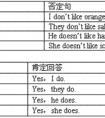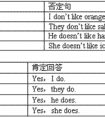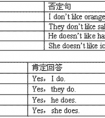根据划线部分提问。1、Heoftendoeshistestinthelab. 2、Martincananswerallthequestions.3、Mostoftheplantswillbedeadbecauseofnowater. 4、JackwillleaveforLondonbyEa-六年级英语
题文
| 根据划线部分提问。 |
| 1、He often does his test in the lab. 2、Martin can answer all the questions. 3、Most of the plants will be dead because of no water. 4、Jack will leave for London by Easter Airlines Flight 664. 5、We listened to the weather report last night. |
答案
| 1、Where does he often do his test? 2、Who can answer all the questions? 3、Why will most of the plants be dead? 4、How will Jack leave for London? 5、What did you listen to last night? |
据专家权威分析,试题“根据划线部分提问。1、Heoftendoeshistestinthelab. 2、Martinc..”主要考查你对 疑问副词,疑问代词,情态动词,一般将来时,助动词 等考点的理解。关于这些考点的“档案”如下:
疑问副词疑问代词情态动词一般将来时助动词
考点名称:疑问副词
- 疑问副词:
用来引导特殊疑问句,表示时间,地点,方式,原因等,常见的有:when,where,how,why等。
分类:
时间副词:now, then, yesterday, always, already, soon
地点副词:here, home, upstairs, nowhere, above, near, beyond
方式副词:多数是形容词加上ly构成的,和一些well, fast, quick, slow, hard, alone, straight, wide
在加词尾ly时要注意:
(1)辅音+le:simple→simply, gentle→gently,
(2)以ic结尾的词:classic→classical但是public→publicly
(3)以辅音读音是[i]的y结尾的词:easy→easily
(4)特例:full→fully, whole→wholly, true→truly
程度副词,连接副词,关系副词
much, enough, quite, hardly, almost, deeply
疑问副词连接副词,关系副词:
how,who,where - 疑问副词在句中的位置及用法举例:
由于疑问副词后接疑问句,因此这些副词一般都位于句首。例如:
How do you go to school? 你怎么去上学?
Why do you dislike the game? 为什么你不喜欢这个游戏? - 疑问代词和疑问副词区别:
1. 疑问代词做对陈述句的主语,宾语或定语提问,即做句子的主语,宾语或定语, 如:
what, who/ whom, whose.
eg. Who is talking ?
What can you see?
Whose shirt is this?
2.疑问副词对时间,地点,方式等状语提问,如:
when, where, how 等.
eg. When is your birthday?
Where are you going?
How do you know?
考点名称:疑问代词
- 疑问代词:
在句子中用来构成特殊疑问句,主要用于询问“何人”、“何事”、“什么”。
常见的疑问代词如下表所示:
疑问代词
替代范围
who
人
whom
人
whose
人
which
人、事、物
what
事、物
考点名称:情态动词
情态动词:
是一种本身有一定的词义,但要与动词原形及其被动语态一起使用,给谓语动词增添情态色彩,表示说话人对有关行为或事物的态度和看法,认为其可能、应该或必要等。
情态动词后面加动词原形。情态动词词义不完全,不能单独作谓语,只能与动词原形一起构成谓语。
情态动词有四类:
①只做情态动词:must,can(could),may(might)……
②可做情态动词又可做实义动词:need,will
③具有情态动词特征:have(had,has) to,used to,ought to
④情态动词表猜测:一肯一否三不定(must一肯,can not一否,may,might,could,三不定。)
注:mustn't代表强烈禁止 must表示主观,have to表示客观。
常用的有:can may could must have use .(can,may,must,should,need)
例:Kate can swim. 凯特会游泳。
May I borrow your dictionary, Ann? 安,我可以借用你的字典吗?
- 最新内容
- 相关内容
- 网友推荐
- 图文推荐
| [家长教育] 孩子为什么会和父母感情疏离? (2019-07-14) |
| [教师分享] 给远方姐姐的一封信 (2018-11-07) |
| [教师分享] 伸缩门 (2018-11-07) |
| [教师分享] 回家乡 (2018-11-07) |
| [教师分享] 是风味也是人间 (2018-11-07) |
| [教师分享] 一句格言的启示 (2018-11-07) |
| [教师分享] 无规矩不成方圆 (2018-11-07) |
| [教师分享] 第十届全国教育名家论坛有感(二) (2018-11-07) |
| [教师分享] 贪玩的小狗 (2018-11-07) |
| [教师分享] 未命名文章 (2018-11-07) |

![—— He'sneartheTVset (电视机).[ ]A.What'stheboydoing?B.Where'stheboy?C.Whoistheboy?-三年级英语](http://www.00-edu.com/d/file/ks/4/1/38/2019-08-19/smalla98d03e1cd1ad5f1eea83d4f5e418fe61566228470.jpg)
![_________ didyou_________?[ ]A. Where; wentB. Where; goC. What; went-六年级英语](http://www.00-edu.com/d/file/ks/4/1/38/2019-08-19/small4cca8e85fae1eda0cb114208d0da83c91566228121.jpg)



